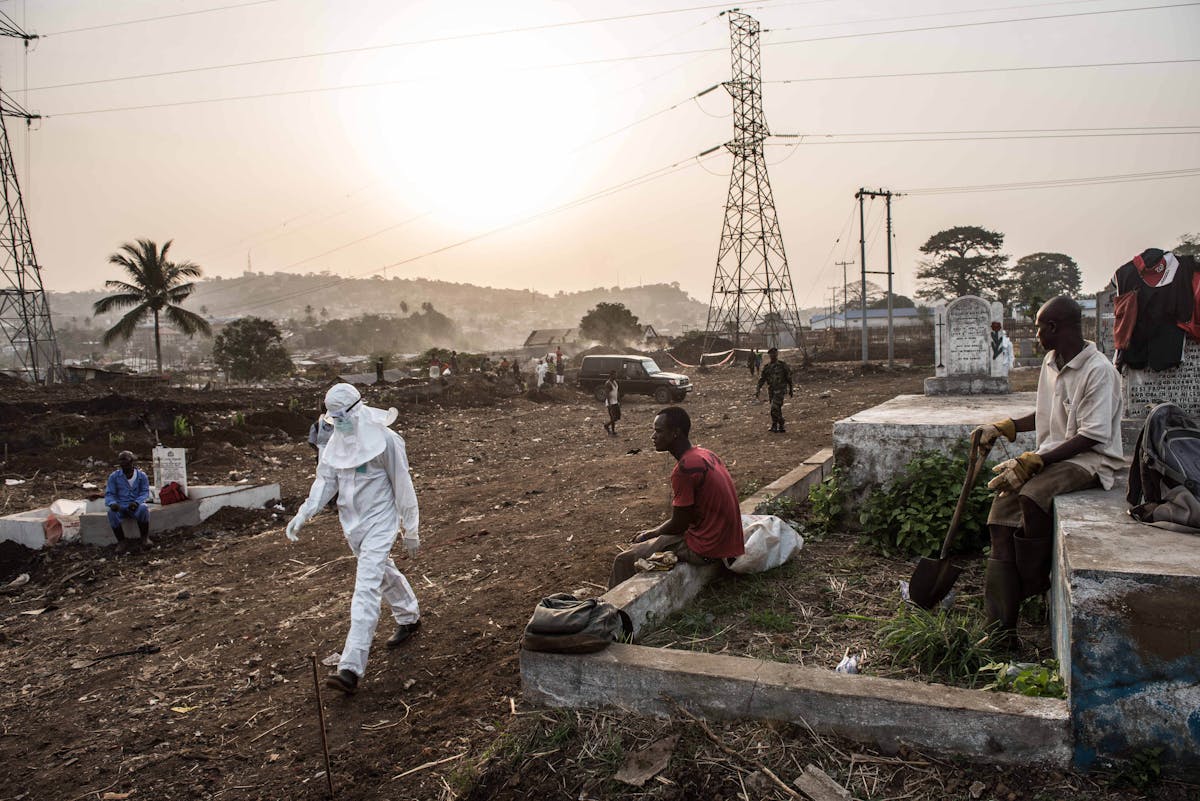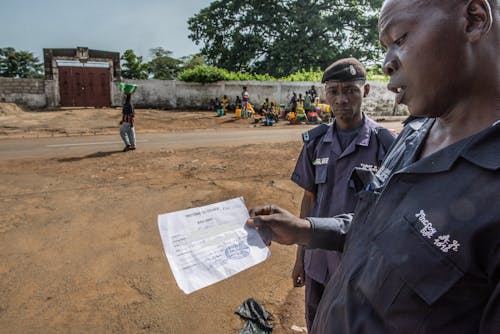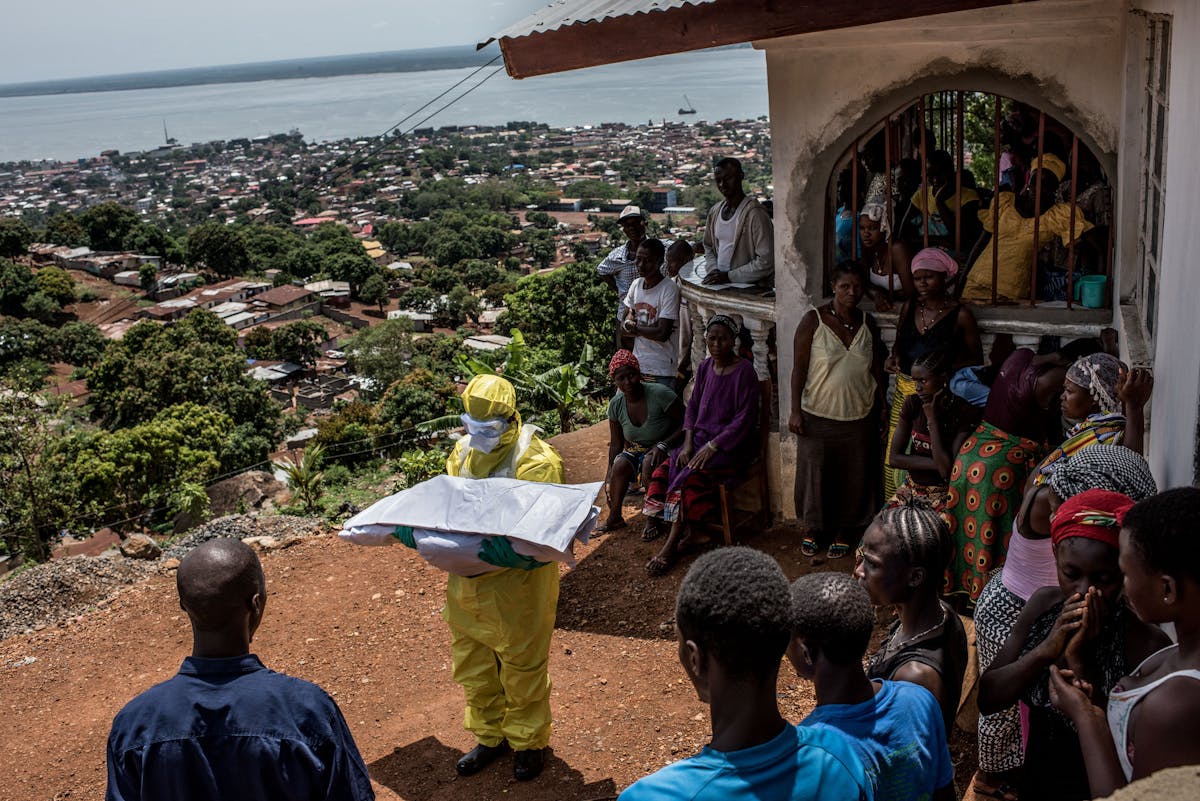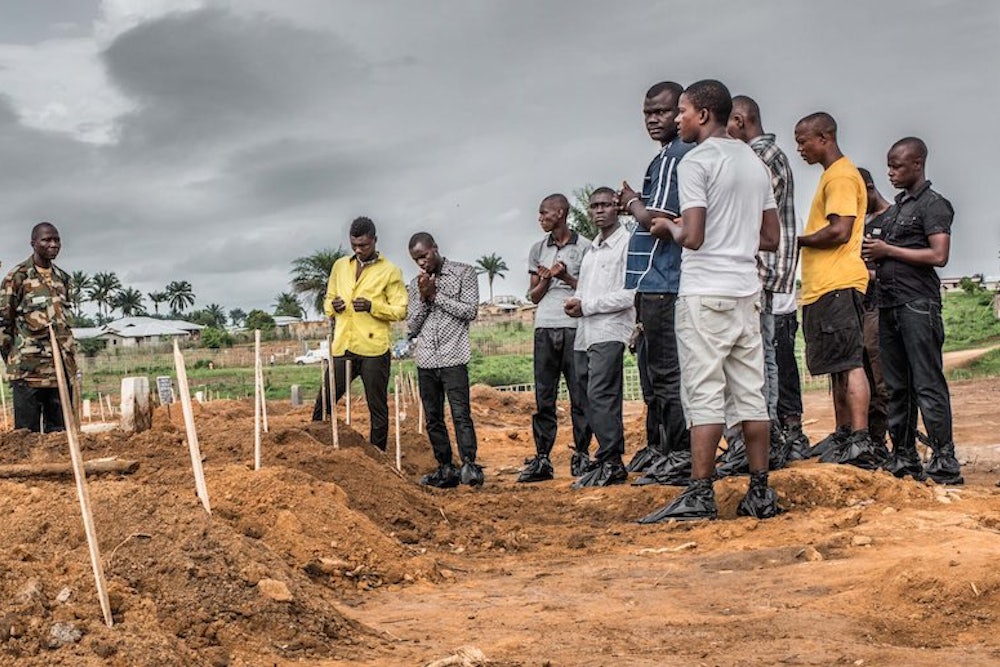On a barren hillside outside Sierra Leone’s capital, Freetown, Alieu Mansaray put on a brave face as strangers in full plastic bodysuits lowered his father’s body into the grave. His 71-year-old father had died of a stroke. Everyone knew that. But in a country where the highly contagious Ebola virus continues to take lives, this is a sacrifice that Sierra Leoneans have come to accept.
In another time, Mansaray explained, the body would have been washed, dressed and perfumed, before being taken to the local mosque for prayers. Then the family would have taken him to a graveyard near their home in the city’s eastern suburbs and laid him to rest in a white cotton shroud.
“It’s really hard. When someone dies you want to bury them in a special way. But this is the law, so we do it,” he said. “I am a patriotic man, and if we want to reach zero new [Ebola] cases it’s important they keep doing this.”
Ebola is at its most virulent in the hours and days after death—a single unsafe burial can infect dozens—making the safe burial policy key to stamping out the stubborn embers of the outbreak. Sierra Leone, where the virus has killed over 3,500 people, is still seeing a handful of new cases each week. The country has seen 16 cases in the last two weeks, including in Freetown, which was thought to have eradicated the disease.
The rules are simple. All bodies—not just those suspected of carrying Ebola—should be buried within 24 hours by a trained Ebola burial team wearing full protective equipment in an authorized burial ground. Rigid safety precautions are outlined for every step of the procedure.

“Universal safe, dignified medical burials will be conducted on all bodies, nationwide; there are no exceptions,” according to the burial guidelines put out by the National Ebola Response Centre, the body in charge of directing the fight against the disease in Sierra Leone. The country remains under a state of emergency, and President Ernest Bai Koroma has been clear that anyone who doesn’t comply with the rules will be arrested and charged.
But these rules do not seem to apply to everybody. Since the numbers of new Ebola cases started dropping earlier this year, more and more of Freetown’s elite have been burying loved ones as they please.
“It happens every day,” said a worker at the main government mortuary in Freetown who preferred to remain anonymous. “If you’re just a normal person they tell you no, but if it happens to a minister or a military officer there is always a way to settle it... In Sierra Leone it is usually the people who make the rules who end up breaking them.”
He said that in the past two months high profile figures including a member of Parliament, a leading religious figure, the deputy health minister and the mayor of Freetown had all participated in illegal burials.
The mayor, Franklyn Bode Gibson, did not respond to requests for comment, while a spokesman for Madina Rahman, the deputy health minister, said that if Rahman had participated in an unorthodox burial, it was because a body had been flown in from overseas. He insisted any burial the deputy minster had attended had been authorized. According to the director of the NERC’s situation room, O.B. Sesay, a high profile Imam was arrested after participating in an illegal burial in eastern Freetown, while the member of parliament, Alie Badara Munu was arrested in June.
On a recent visit to the mortuary, the scene was chaotic. Several bodies lay on the floor under white sheets; one blocked a corridor, forcing visitors to pass in single file. Posters adorning the walls advised visitors, “Don’t touch the walls!” as military officers shouted instructions about swab numbers, and told grieving relatives how to skirt the rules for Ebola-safe burials.
As staff in little or no protective equipment lifted a coffin into a waiting hearse, bystanders whispered that “this one was a city councilor” and that there would be plenty of dignitaries at her burial. They said it was the fourth illegal burial of the day.
Using wealth or influence, the bereaved ensure that the body is not taken straight away for burial, but that it is left in the mortuary until the swab results come back to confirm whether or not it is infected with Ebola. If negative, they arrange for a private team to transport the body to the burial ground of their choice.
“Sometimes we wait three days for the results,” said the worker at the main government mortuary. “It’s dangerous when you don’t know which bodies are positive and which are negative. But we try to keep them apart. Several times we kept the body and it turned out positive.”

When I visited the Kingtom Cemetery, a large expanse of grave-studded scrubland on the edge of a smoldering rubbish heap in central Freetown, an illegal burial was underway in broad daylight. Flashy 4x4s crowded the entrance while a small ceremony took place within the cemetery.
The burial team wore a mishmash of protective equipment. Some wore gloves, others aprons, a few rubber boots. One worked in red snakeskin brogues. As soon as the body was deposited in the grave they rushed off, casting the used protective clothing onto the ground as they left.

When questioned about the burials, an elderly cemetery manager in a Chelsea FC soccer shirt produced documents he said validated the proceedings. It transpired the city council has been issuing burial permits sanctioned by the Registry of Births and Deaths.
When I visited them on the top floor of a dilapidated tower block in the city center, officials said simply that nobody had told them to stop issuing the permits. As long as a doctor had performed an autopsy, it was “business as usual.”
“We don’t just do it for anybody, though,” added one.
The Red Cross, which leads the Ebola burial operations in Sierra Leone, said the permits were completely illegal. “We bring these complaints to the NERC. It’s always coming up in meetings. It’s worrying that no action has been taken,” said Daniel James, the organization’s national supervisor for safe and dignified burials. “All it takes is one or two bad burials and this thing can restart.”
O.B. Sisay, the director of the situation room at the NERC, said, “It’s been happening for a while now, and it’s growing. It’s a serious problem.” Swabs are not 100 percent accurate, he says. False negatives happen, so burying a body without full protective measures is still extremely risky.
The illegal burials also threaten the hard-won compliance of the rest of the population.

“Everything that happens outside the system undermines the system. It’s fucking up public support. And if we lose the public, we lose the war,” Sesay said. “If we can’t get on top of this spate of illegal burials by the rich and powerful, we lose the support of the people.”
After saying prayers over the newly dug grave of his father at the burial ground outside Freetown, Alieu Mansaray expressed a similar sentiment.
“It makes me sad when these lawmakers and powerful people can just break their own rules,” he said. “Even though I’m a hundred percent certain my father did not have Ebola, we came here anyway, because we love our country.”
Correction: A previous version of this article misspelled the first name of Freetown Mayor Franklyn Bode Gibson.
